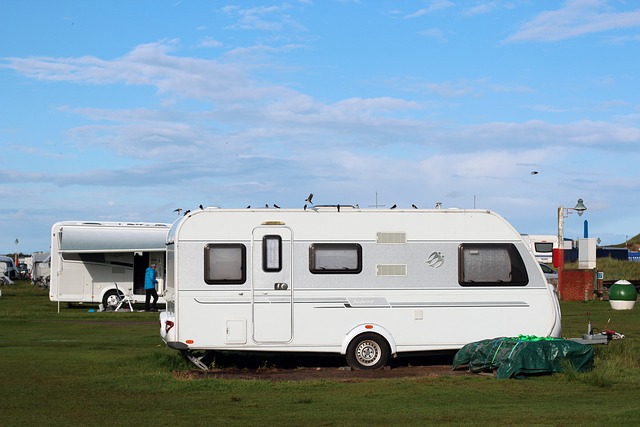Camping is a popular outdoor activity enjoyed by many people around the world. With the growing popularity of van life, more and more people are opting to camp in their vans. However, it’s important to know whether campsites allow vans or not before planning your trip.
In this guide, I’ll explore the different types of campsites, the types of vans used for camping, and whether campsites allow vans. I’ll also provide tips for van camping at campsites and alternatives to campsites for van camping. Whether you’re a seasoned van camper or just getting started, this guide will provide valuable information to help you plan your next adventure.
What Are Campsites?
A campsite is a designated area where people can pitch their tents or park their vehicles for the purpose of camping. Campsites can be found in various locations such as national parks, state parks, private campgrounds, and other recreational areas. They typically provide basic facilities such as fire pits, picnic tables, restrooms, and potable water. The amenities and services provided at campsites can vary depending on the type of campsite and its location. Some campsites may have RV hookups, showers, laundry facilities, and camp stores, while others may have minimal facilities and services.
Types of Vans Used for Camping
When it comes to camping in a van, there are several types of vans that people use for this purpose. Here are 4 of the most popular types.
- Campervans: These are vans that have been specifically designed and converted for camping. They often have a raised roof or pop-top to provide extra headroom, as well as a built-in bed, kitchenette, and storage space.
- Conversion vans: These are regular vans that have been converted into camper vans by adding a bed, storage, and other camping essentials. They are often customized to the owner’s preferences and can be more affordable than a pre-built campervan.
- Cargo vans: These are vans typically used for commercial purposes, but can also be converted into camper vans. They offer a lot of space for customization and can be more affordable than other types of vans.
- Class B RVs: These are larger than typical camper vans and are built on a van chassis. They offer more amenities and features, such as a bathroom and a larger living space, but can also be more expensive.
Do Campsites Allow Vans?
Whether campsites allow vans or not can vary depending on several factors, including the size of the van, the age of the van, and the type of van. Some campsites have restrictions on the size of vehicles they allow, while others may have restrictions on the age or type of vehicle. Here are some things to consider:
- Size restrictions: Some campsites may have size restrictions on vehicles, which could affect whether a van is allowed or not. Check with the campsite ahead of time to see if there are any size restrictions.
- Vehicle age restrictions: Some campsites may have restrictions on the age of vehicles they allow. This could affect whether an older van is allowed or not.
- Type of van restrictions: Some campsites may have restrictions on the type of vehicle they allow. For example, some campsites may not allow conversion vans or cargo vans.
It’s important to research the campsites you plan to visit ahead of time to see if they allow vans or not. Some campsites may have specific areas designated for van camping, while others may not allow vans at all. It’s always a good idea to call or email the campsite to confirm their policies before making reservations.
Tips for Van Camping at Campsites
If you’re planning to camp in a van at a campsite, here are 5 tips to help make your experience a success.
- Research campsites beforehand. Before heading out, research campsites in the area to find out which ones allow van camping. Look for reviews and ratings from other van campers to get an idea of what to expect.
- Arrive early to secure a spot. Popular campsites can fill up quickly, so it’s best to arrive early to secure a spot. If you have a reservation, make sure to arrive before check-in time to avoid losing your spot.
- Be respectful of other campers. Van camping can be a bit different than traditional camping, so it’s important to be respectful of other campers. Keep noise levels down, clean up after yourself, and follow the campsite’s rules and regulations. (Click here to learn the dos and don’ts of camping etiquette)
- Follow all rules and regulations. Make sure to follow all the rules and regulations of the campsite. This includes things like using designated fire pits, not driving on the grass, and properly disposing of waste.
- Leave no trace. When van camping, it’s important to leave the campsite better than you found it. Make sure to properly dispose of all waste, including trash and wastewater. Avoid damaging the environment by staying on designated trails and using designated camping areas.
Alternatives to Campsites for Van Camping
If campsites are not an option for your van camping trip, there are alternative options to consider:
- Dispersed camping: Dispersed camping allows you to camp in designated areas on public lands, such as national forests or Bureau of Land Management (BLM) land. These areas may have fewer amenities than campsites but offer more privacy and seclusion.
- Boondocking: Boondocking is similar to dispersed camping, but typically refers to camping in more remote locations, such as on private property or in the wilderness. It may require more preparation and planning but can offer a unique and secluded camping experience.
- Parking lots and rest areas: Some parking lots and rest areas allow overnight parking for RVs and vans. While these options may not offer the same amenities as a campsite, they can be a convenient and affordable option for overnight parking.
- Private land: If you know someone with private land, they may be willing to let you camp on their property. Make sure to get permission first and follow any rules or guidelines they may have.
When considering alternative options for van camping, make sure to research the rules and regulations for each location and follow all guidelines to ensure a safe and responsible camping experience.
Conclusion
Camping in a van can be a fun and rewarding experience, but it’s important to know whether campsites allow vans or not before planning your trip. Whether campsites allow vans or not can vary depending on several factors, including the size, age, and type of van. It’s important to research the campsites you plan to visit ahead of time to see if they allow van camping and to follow their rules and regulations to ensure a safe and responsible camping experience.
Remember to research campsites and alternative options ahead of time, follow all rules and regulations, and leave no trace to ensure a safe and responsible van camping experience. I hope this guide has provided valuable information to help you plan your next adventure.










